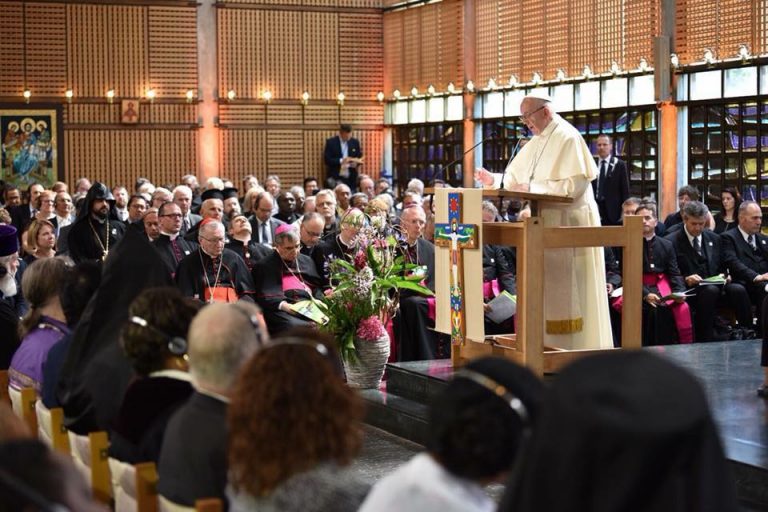
Pope Francis joined the general secretary of the World Council of Churches (WCC) and the moderator of its Central Committee at an ecumenical meeting during his landmark 21 June visit to the WCC to celebrate its 70th anniversary at an ecumenical meeting in Geneva. The Pope began the visit by joining in prayers in the chapel of the Ecumenical Centre in Geneva after flying in from Rome and then visiting the Ecumenical Institute at Bossey, which is involved with theological formation. In the afternoon Pope Francis again visited the Ecumenical Centre, where the WCC does much of its work. There he spoke along with Tveit and Dr Agnes Abuom, moderator of the Central Committee, an important WCC governing body.
“Here I would like to reaffirm that the Catholic Church acknowledges the special importance of the work carried out by the Faith and Order Commission and desires to keep contributing to that work through the participation of highly qualified theologians,” said Pope Francis. “The quest of Faith and Order for a common vision of the church, together with its work of studying moral and ethical issues, touch areas crucial for the future of ecumenism.” The Pope cited the active Catholic presence in the Commission on World Mission and Evangelism; collaboration with the Office for Interreligious Dialogue and Cooperation, most recently on the important theme of education for peace; and the joint preparation of texts for the Week of Prayer for Christian Unity. “I also value the essential role played by the Bossey Ecumenical Institute in the training of future pastoral and academic leaders in many Christian churches and confessions worldwide,” said the Pope.
Tveit, in his address, said the papal visit to the WCC has shown how divisions, distance, and conflicts can be overcome as a sign of hope. “Let us make it possible for the next generations to create new expressions of unity, justice, and peace – as we share more and more together,” said Tveit. He said the visit shows “that it is possible to overcome divisions and distance, as well as deep conflicts caused by different traditions and convictions of faith. “There are several ways from conflict to communion. And of course, we have not yet overcome all differences and divisions. Therefore we pray together that the Holy Spirit will guide us and unite us as we move on,” said Tveit.
Pope Francis’ visit is the cornerstone of the ecumenical commemoration of the WCC’s 70th anniversary and marks 50 years of cooperation with the Roman Catholic Church in the quest for Christian unity. The theme of the visit is an “Ecumenical Pilgrimage – Walking, Praying and Working Together” and the meeting began with a prayer service at the Ecumenical Centre chapel.
“Your Holiness, your visit is a sign of this hope we share. It is a milestone in the relations among the churches. We are here as representatives of different churches and traditions from all over the world,” said the general secretary.
In 2017, Roman Catholic and Protestant Lutherans jointly commemorated the 500th anniversary of the Reformation which split a major part of Christianity apart when Martin Luther led protests over practices by the church that reverberated for centuries. Geneva was an important city in the Reformation.
Tveit noted, “By walking, praying and working together during these last 70 years, we have learned much about what it means to be a fellowship of churches. “That is also how the relationship has developed between the WCC and the Roman Catholic Church after more than 50 years of cooperation.” He explained that the profile of the work of the WCC and many of our partners today is “being together on a Pilgrimage of Justice and Peace.” Tveit said the WCC and the Catholic Church work together for joint peace initiatives in many places in the world as they address the situation of refugees along with issues of economic justice and dealing with poverty. “We work hard together to combat climate change and other threats to our environment. We promote inter-faith dialogues and initiatives for peace. We mobilize together for the Sustainable Development Goals. We prepare the annual prayers for Christian unity together.”
Moderator Abuom spoke on the fruits of cooperation with the Roman Catholic Church in “many concrete situations”. “Let me just highlight how important it is that Christian churches look at each other as one, in South Sudan, how critical joint action for justice and peace is for the peace process in Colombia; how powerful it is to pray and work together for the reunification process in the Korean Peninsula; how much a concerted action is needed in Burundi and the Democratic Republic of Congo,” said Abuom. She told Pope Francis his visit at the Ecumenical Centre in Geneva shows that the “churches’ commitment to unity for the sake of all humanity and all of God’s creation is alive and strong,” said the moderator, who is a Kenyan Anglican.